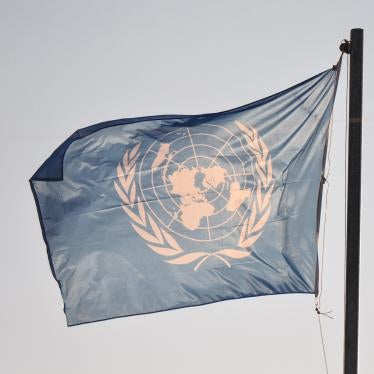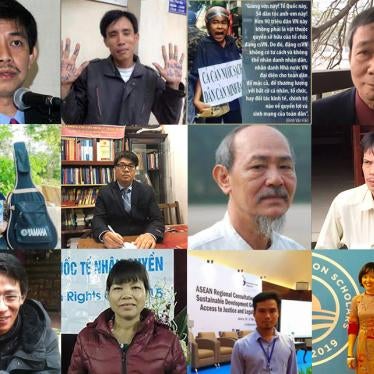“A single short document of 30 articles”—the 1948 Universal Declaration of Human Rights—“has probably had more impact on mankind than any other document in modern history,” said Navi Pillay, then-United Nations High Commissioner for Human Rights, in 2008. Half a century ago, in December 1966, the United Nations formally translated the rhetorical promises from that declaration into legally binding obligations with the adoption of the International Covenant on Civil and Political Rights and the International Covenant on Economic, Social and Cultural Rights. Since then, global efforts to monitor and track human rights violations have grown exponentially.
Nevertheless, rights abuses remain rampant. As the treaty-based human rights system celebrates its fiftieth anniversary, how can we reconcile an increasingly sophisticated global architecture to monitor rights violations with the reality of persistently brazen abuses around the world? At 50, is the system facing a midlife crisis?
Some Governments seem to rely on systems that are fundamentally hostile to basic individual human rights. Demagogues are preying upon public anxiety, stoking divisions and justifying policies that violate rights as necessary measures to respond to the threat of terrorism, curb the use of drugs, or stem migration. And abuses intensify during wartime, as the Independent International Commission of Inquiry on the Syrian Arab Republic found in its February 2016 report on the Syrian Government’s mass torture of political detainees, and the Commission on Human Rights in South Sudan noted following a December trip to the country, where they found that sexual violence had reached epic proportions.
While Ms. Pillay’s 2008 remarks heralded the growth of a rules-based human rights system, the current United Nations High Commissioner for Human Rights, Zeid Ra’ad Al Hussein, has expressed alarm at its erosion. “The defenders of what is good and right are being outflanked, in too many countries, by race-baiting bigots, who seek to gain, or retain, power by wielding prejudice and deceit, at the expense of those most vulnerable,” he warned when addressing the September 2016 United Nations Summit for Refugees and Migrants.
United Nations Secretary-General António Guterres has gone further, saying: “The United Nations was established to prevent war by binding us in a rules-based international order. Today, that order is under grave threat.”
It’s hard not to worry, given the embrace of torture by a previous United States administration, and the exploitation of hatred and intolerance during the recent presidential campaign in that county, along with the rising influence of nativist political parties in Europe. These developments have put the whole human rights system at risk. When a former United Nations special rapporteur on torture recently asked Gambian authorities for permission to visit their prisons, they replied ”Why don’t you go to Guantánamo instead?”
Still, it’s important to remember that by signing and ratifying the two complementary and interlocking Covenants, Governments around the world pledged to respect, protect and fulfil everyone’s fundamental and inalienable human rights. In committing to these two documents, leaders agreed to be held accountable, not just to their own citizens’ expectations, but also against the international community’s universal yardstick. The international system for tracking and monitoring the status of human rights offers an important vehicle for holding Governments to those commitments. Indeed, in the four decades since the Covenants came into force in 1976, global mechanisms to assess the status of human rights have become a fixture on the international landscape.
From the work of experts on human rights treaty bodies, such as the Committee on Economic, Social and Cultural Rights and the Human Rights Committee, to the recent regular Universal Periodic Review of all countries’ rights records by the Human Rights Council, there is now an expansive global structure to assess, monitor and criticize human rights violations.
At the regional level, in Europe, Latin America and Africa, analogous mechanisms exist to hold States responsible when they fail to meet their obligations. Sudanese activists have successfully brought claims against their Government to the African Commission on Human and Peoples’ Rights. In July 2014, the European Court of Human Rights ordered Poland to pay two men €100,000 in damages each for its role in their arbitrary detention and torture in the country by the United States Central Intelligence Agency.
At the national level, human rights institutions such as the Australian Human Rights Commission or the South Africa Human Rights Commission help mainstream the protection and promotion of human rights. Domestic courts, such as the Indian Supreme Court and the German Federal Constitutional Court, have also drawn on the international obligations outlined in the Covenants in their own legal reasoning to help develop and expand human rights protections in their own national systems.
Perhaps the most significant development, even at the local level, is that the discourse about human rights has become commonplace. The family of Michael Brown, an unarmed black man killed by a police officer in the United States chose to submit a written statement on their son’s death to the United Nations Committee against Torture. Indigenous groups, such as the U’wa of Colombia, the First Nations of Canada, and the Ogoni of Nigeria have all adopted the human rights framework to advance their causes. Eleanor Roosevelt famously said: “Where, after all, do universal human rights begin? In small places, close to home—so close and so small that they cannot be seen on any maps of the world. […]. Unless these rights have meaning there, they have little meaning anywhere. Without concerned citizen action to uphold them close to home, we shall look in vain for progress in the larger world.”
While the discourse and practice of human rights monitoring have undoubtedly taken root, abusive Governments have also grown adept at capturing, manipulating and exploiting the system for their own benefit.
Corporations, while not directly bound by the Covenants, have responsibilities to uphold and protect human rights. In some cases, corporations’ fluency in corporate social responsibility norms and comfort working within its architecture can help shield them from valid criticism. The International Finance Corporation (IFC), the World Bank’s private sector lending arm, invested millions in India’s tea sector through the Tata Group despite serious human rights and labour concerns in plantations receiving the investment.
A compliance investigation later found that IFC relied too heavily on the Tata Group’s reputation and stated intention to meet external certification standards instead of conducting an independent review of environmental and human rights concerns, even though IFC policies required oversight. It seems, at least in this case, that the safeguards built into the IFC due diligence systems were circumvented by rhetoric about compliance that belied reality. The same occurs at the intergovernmental level. When Saudi Arabia ran for election to the Human Rights Council in 2013, its Government pledged to “support the human rights bodies and mechanisms of the United Nations and cooperate constructively with them, particularly the Human Rights Council and its subsidiary mechanisms.” In response, Human Rights Watch and Amnesty International jointly called for the United Nations General Assembly to suspend Saudi Arabia’s membership in the Council by pointing to the gross and systematic violations of human rights it committed during its time as a member, and highlighting how it took advantage of its seat to shield itself from accountability for its violations in Yemen.
Abusers do not need to sit on global bodies to benefit from the diplomatic cover the system affords. At the United Nations Security Council, the Democratic People’s Republic of Korea has been shielded from criticism of its horrific human rights record. In December 2016, in response to a request by nine Council members for a mere discussion of the human rights situation in that country, a permanent member of the Council forced a procedural vote on the issue, arguing that the Security Council was "not a forum for discussing human rights issues and still less for the politicization of the human rights issue." Opposition to these discussions of human rights has limited human rights monitoring at the Security Council to a single annual meeting and prevented any kind of formal outcome.
While the treaty-based monitoring system is crucial, norm construction has its limits without a steadfast commitment to implementation. States that ratified the Covenants have a collective responsibility to safeguard against erosion of these core principles by holding abusive States to account and working across their regional and political divides to address global issues such as migration, counterterrorism and the rise in xenophobia.
As we reflect on the treaty-based human rights system at 50, it is clear that building a sophisticated architecture to monitor and track human rights violations is insufficient to end these abuses. In too many places, rhetoric simply doesn’t match reality. After engaging with the United Nations Committee against Torture for one session and responding to questions on allegations of torture by its officials, Burundi’s delegation did not show up for the second meeting, at which it was expected to provide replies. Instead it sent a note verbale, which reiterated its commitment to cooperate with human rights treaty bodies while stating it was counterproductive to raise allegations “in the way done by the Committee.” In other places, the recommendations of treaty-body experts are ignored. Although Sudanese activists successfully brought a claim and secured a judgment at the African Commission of Human and Peoples’ Rights, they have yet to see it implemented.
Some abusers appear to be shameless and even seek to bolster their power by leveraging the condemnations issued by the international human rights system for recruitment or to use famed brutality for its assumed deterrent effects. Still, without these systems to track and monitor abuses, hope for justice and accountability would be even dimmer. Without efforts to collect evidence and identify abusive behaviour as being in violation of international obligations, victims would be without a vehicle for redress.
While imperfect, the simple act of monitoring abuses and calling them by their rightful name has undeniable power.









